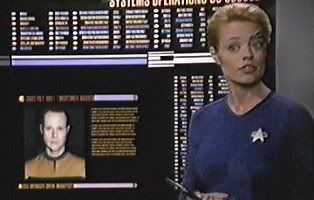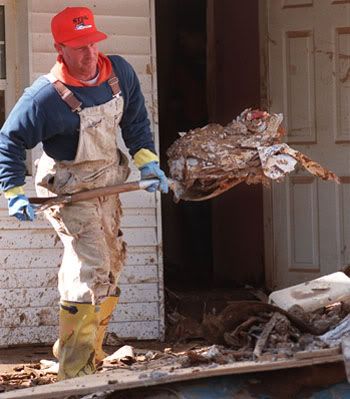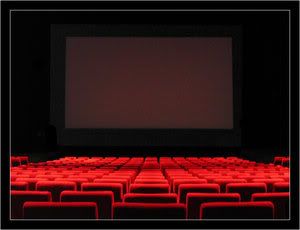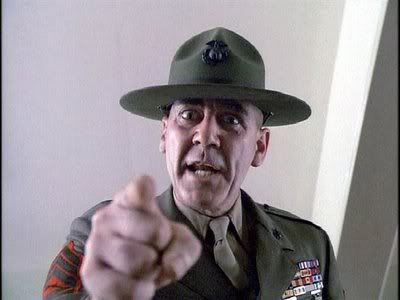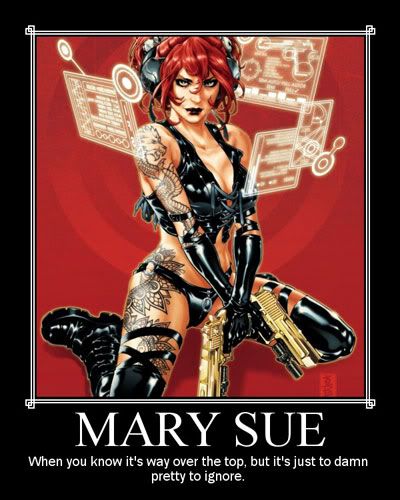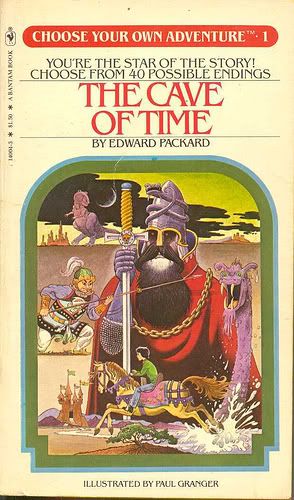
Old book is old. Even the guy on the cover is old.
I have a dog-eared copy of the first Choose Your Own Adventure book, the Cave of Time, somewhere in my collection. I adored reading it over and over again, because every time I picked it up, something different was going to happen. Now, granted, I died more often than I succeeded, but I don’t think that’s any different from how most video games play out, especially those games called action/adventures.
To be honest, I hate the term ‘action/adventure’ when applied to video games. It feels like the term was dreamed up just to get applied to games that don’t fall conveniently into a single game-play type. Halo‘s a first-person shooter. Command & Conquer is an RTS game. Gran Turismo is a racing game. Assassin’s Creed? Action/adventure.
The thing about a game like Assassin’s Creed, though, is that the game isn’t just there to be a game. It’s also there to tell a story. Halo, for the most part, has a story that, while not the worst in gaming, merely exists to get the player from one arena filled with squishy targets to the next. A lot of shooters fall into this, and several hack-and-slashers as well (I’m looking at you, Kratos). I don’t want to seem like I’m ragging on games that exist just to entertain. Believe me, I’m just as amused and distracted by shiny objects, spurts of blood and full frontal nudity as the next guy. But a game really gets my attention when something else is going on that pulls me in.
For the sake of comparison, let’s look at Halo in contrast to BioShock.
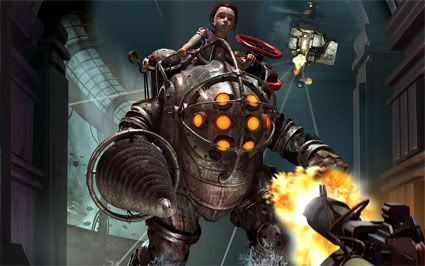
No Brute ever gave me that “OH SHI-” feeling I got when I took on a Big Daddy for the first time.
BioShock is not without a few problems. It was advertised as a mix of shooting & role-playing but ended up leaning far more towards the shooting side of things. The morality system was an ‘either-or’ choice rather than a sliding scale. And the final boss is something of a let-down. However, I love BioShock in spite of its flaws because of its deep and interesting story. Instead of the typical badass X wading into situation Y with overpowered weapon Z, the player’s character is thrust into a situation in a completely alien environment and is unaware of both his potential and the dark secrets that await. In Halo, Master Chief knows he’s a badass, goes about things in his badass way, hefts badass weapons without any problems because he’s a badass, and goes about saving the galaxy in an almost nonchalant way as fits his badass idiom. I hope I’ve used the word ‘badass’ enough times to properly demonstrate how boring I find the stories in the Halo universe. Good concepts, mind, and a badass protagonist to be sure. But kinda dull in the execution. Then again, Halo seems more and more to be a vehicle for teenagers to shoot lasers at each other and teabag their opponents.
And maybe I’m just tired of having to wash that taste out of my mouth. Anyway, let’s move on.
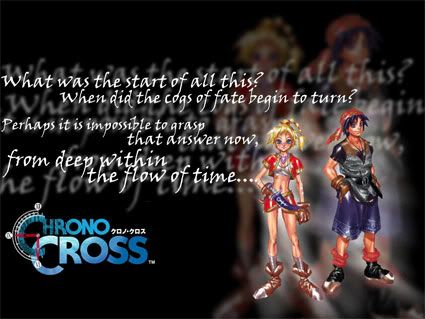
Right up there with Xenogears in terms of ‘games that do dirty things to your brain’.
My wife recently played through Chrono Cross for the second time, and I have to say that I need to make time to play through it myself. In addition to suggesting someone make a time-travel MMO, she points out that the story of the game is not only well-written but the kind of thing that fucks with your mind. Now, it’s an older PSOne game, so the graphics aren’t as top-notch as they once were and some of the game systems look a bit clunky from the outside. Again, this is me, and I haven’t played it myself. However, seeing some of the story playing out and the depth given to the various characters pulled me in just as an observer. I can only imagine the experience that awaits me as a player.
I’ve never played The Force Unleashed either, but I don’t think I have to. The penance I must pay for liking the prequel films when I was younger is coming, and I know I must pay it because I am quite guilty of my sins. However, I’ve tried to mitigate the damage to the memory of my childhood, which I pray shall rest in peace after being thoroughly flash-liquefied by the blazing bonfire of ego put on the screen not once but three times by Lucas. I’ve avoided the CGI Clone Wars mess like the plague, only deigning to watch Confused Matthew‘s review of the film, and I refuse to play Force Unleashed. It, too, is something of a sweeping epic, but it is, by all accounts, full of wooden characters with flat dialog and pointless computer-driven action sequences that have little to no relevance to the story. If it turns out the case is otherwise, in comparison to Lucas’ other recent work, I would be very surprised. I hope the comparison is clear: both games deal with impossible feats (time travel and psychoflexus powers, respectively), both aim for expansive stories and both want to draw us into the lives of the characters. Just from observation, as far as I can tell, Chrono Cross is a shining success while The Force Unleashed is a bombastic high-energy failure.
It’s possible I’m being overly biased about this, and that I’ve been somewhat spoiled by earlier games that feature story in lieu of graphics and physics engines. I’ve covered what I enjoy about Mass Effect, and one of the things I talk about is its story. However, while there’s nothing wrong with having a linear story, and Mass Effect‘s is pretty linear when the side-quests are left out, I do sort of miss the ‘branching campaign’ system that, to my knowledge, hasn’t been used much since I first experienced it in Wing Commander.
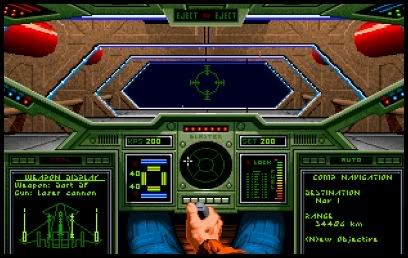
Long before MMOs, I was wasting hours on video games. This series in particular.
I wax nostalgic when I think of Wing Commander. In a game that hearkens to the likes of Battlestar Galactica and Space: Above and Beyond, you’d think the main selling point for me would be the ability to hop into a space fighter and fire my lasers at antagonistic aliens. And while that’s always fun, especially for a space cadet like myself, the other thing that makes it stand out in my mind along with those shows is the intricate and well-crafted story. And instead of moving along from one plot point to the next regardless of your actions, the success or failure of a particular mission can take the story in an entirely new direction. I don’t know about you, but to me the idea that I can alter the fate of my shipmates and the entire human race I’ve been sworn to defend excites me. It makes me want to go back and play through the original Wing Commander games, 256-color graphics and MIDI music and all.
The difference between Wing Commander and Mass Effect, other than decades of development, advances in gaming technology and the fact that Wing Commander never got past the occasional on-screen kiss while Mass Effect doesn’t flinch at laying hot blue alien booty on us, is that Mass Effect‘s story kindly waits for the player to advance it. “Yes, the Geth are on the rampage and threaten to destroy us all, but go ahead and do a little mining, we’ll be here.” In Wing Commander there’s a different sort of urgency. The player needs to assist the story in determining where it goes next. It’s like those old Choose Your Own Adventure books, which didn’t bother with any sort of linearity other than what was chosen by the reader. I’m not saying that those books or those old games were flawless. In fact, some of the CYOA books could be downright inscrutable.
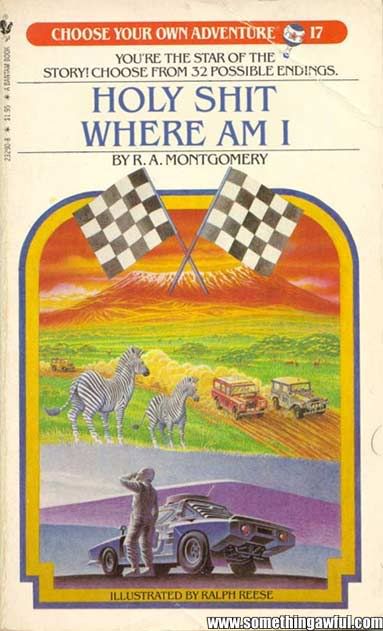
Reading: It’ll expand your kid’s vocabulary!
However, the fact remains that the more control the player is given over the story, the more invested they will be in taking that story to its conclusion. MMOs put the player in the role of storyteller, allowing them to determine how the growth of their character proceeds. Now, many MMO players might be more interested in the aforementioned grind/pwn/teabag environment, but for others, including myself, there should be more to a game than that, otherwise why should I pay someone a monthly fee to do something I can do on my console or PC for free, and have had the capability of doing for years?
On that note, I want to mention how much I’m looking forward to the Star Trek Online open beta. Once again, not only will I be running around space pew-pew-pewing at things, I’ll be helping to tell a story. Like those old CYOA books, I have no idea which way that story is going to go. And that idea, the notion that what is about to happen to me is completely unknown, is undeniably exciting. It’s exciting in ways that running around tossing grenades and crouching over the face of an irate 14 year old boy could never hope to be.

